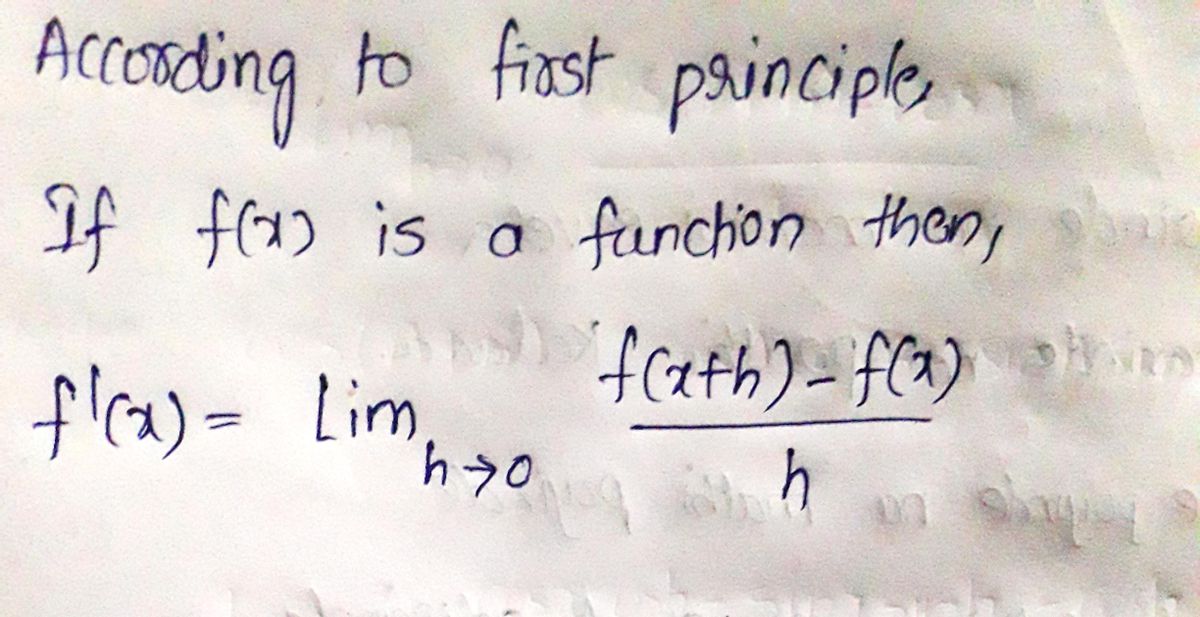Calculus: Early Transcendentals
8th Edition
ISBN:9781285741550
Author:James Stewart
Publisher:James Stewart
Chapter1: Functions And Models
Section: Chapter Questions
Problem 1RCC: (a) What is a function? What are its domain and range? (b) What is the graph of a function? (c) How...
Related questions
Question
Please solve and show all work, thank you!!!
![**Prove, through the limit process, that \(\frac{d}{dx} (\cos x) = -\sin x\).**
### Explanation:
To prove this using the limit process, we start with the definition of the derivative:
\[
\frac{d}{dx} (\cos x) = \lim_{{h \to 0}} \frac{\cos(x+h) - \cos x}{h}
\]
Using the trigonometric identity for cosine, we have:
\[
\cos(x+h) = \cos x \cos h - \sin x \sin h
\]
Substituting this into the limit gives:
\[
\lim_{{h \to 0}} \frac{(\cos x \cos h - \sin x \sin h) - \cos x}{h}
\]
\[
= \lim_{{h \to 0}} \frac{\cos x (\cos h - 1) - \sin x \sin h}{h}
\]
This can be split into two separate limits:
\[
\lim_{{h \to 0}} \frac{\cos x (\cos h - 1)}{h} + \lim_{{h \to 0}} \left(-\sin x \frac{\sin h}{h}\right)
\]
Using limit properties and the known limits:
- \(\lim_{{h \to 0}} \frac{\cos h - 1}{h} = 0\)
- \(\lim_{{h \to 0}} \frac{\sin h}{h} = 1\)
Thus, the expression simplifies to:
\[
\cos x \cdot 0 - \sin x \cdot 1 = -\sin x
\]
Hence, we prove that:
\[
\frac{d}{dx} (\cos x) = -\sin x
\]](/v2/_next/image?url=https%3A%2F%2Fcontent.bartleby.com%2Fqna-images%2Fquestion%2F97689b57-22f1-451b-aeb3-e5f10664de40%2Ffcefd091-c411-4f56-825e-c9d1f84fd32a%2Fr27aagl_processed.jpeg&w=3840&q=75)
Transcribed Image Text:**Prove, through the limit process, that \(\frac{d}{dx} (\cos x) = -\sin x\).**
### Explanation:
To prove this using the limit process, we start with the definition of the derivative:
\[
\frac{d}{dx} (\cos x) = \lim_{{h \to 0}} \frac{\cos(x+h) - \cos x}{h}
\]
Using the trigonometric identity for cosine, we have:
\[
\cos(x+h) = \cos x \cos h - \sin x \sin h
\]
Substituting this into the limit gives:
\[
\lim_{{h \to 0}} \frac{(\cos x \cos h - \sin x \sin h) - \cos x}{h}
\]
\[
= \lim_{{h \to 0}} \frac{\cos x (\cos h - 1) - \sin x \sin h}{h}
\]
This can be split into two separate limits:
\[
\lim_{{h \to 0}} \frac{\cos x (\cos h - 1)}{h} + \lim_{{h \to 0}} \left(-\sin x \frac{\sin h}{h}\right)
\]
Using limit properties and the known limits:
- \(\lim_{{h \to 0}} \frac{\cos h - 1}{h} = 0\)
- \(\lim_{{h \to 0}} \frac{\sin h}{h} = 1\)
Thus, the expression simplifies to:
\[
\cos x \cdot 0 - \sin x \cdot 1 = -\sin x
\]
Hence, we prove that:
\[
\frac{d}{dx} (\cos x) = -\sin x
\]
Expert Solution
Step 1

Step by step
Solved in 2 steps with 2 images

Recommended textbooks for you

Calculus: Early Transcendentals
Calculus
ISBN:
9781285741550
Author:
James Stewart
Publisher:
Cengage Learning

Thomas' Calculus (14th Edition)
Calculus
ISBN:
9780134438986
Author:
Joel R. Hass, Christopher E. Heil, Maurice D. Weir
Publisher:
PEARSON

Calculus: Early Transcendentals (3rd Edition)
Calculus
ISBN:
9780134763644
Author:
William L. Briggs, Lyle Cochran, Bernard Gillett, Eric Schulz
Publisher:
PEARSON

Calculus: Early Transcendentals
Calculus
ISBN:
9781285741550
Author:
James Stewart
Publisher:
Cengage Learning

Thomas' Calculus (14th Edition)
Calculus
ISBN:
9780134438986
Author:
Joel R. Hass, Christopher E. Heil, Maurice D. Weir
Publisher:
PEARSON

Calculus: Early Transcendentals (3rd Edition)
Calculus
ISBN:
9780134763644
Author:
William L. Briggs, Lyle Cochran, Bernard Gillett, Eric Schulz
Publisher:
PEARSON

Calculus: Early Transcendentals
Calculus
ISBN:
9781319050740
Author:
Jon Rogawski, Colin Adams, Robert Franzosa
Publisher:
W. H. Freeman


Calculus: Early Transcendental Functions
Calculus
ISBN:
9781337552516
Author:
Ron Larson, Bruce H. Edwards
Publisher:
Cengage Learning